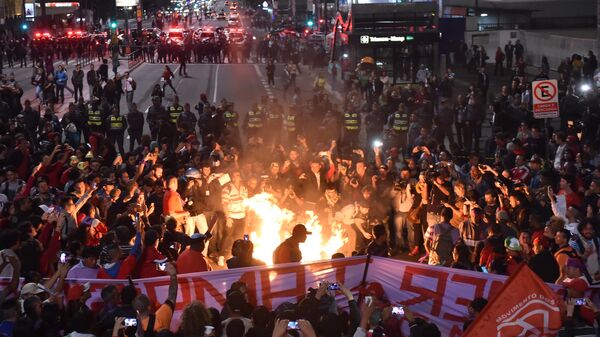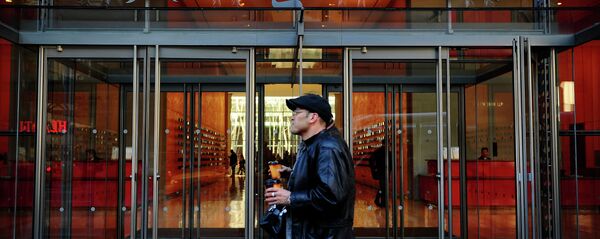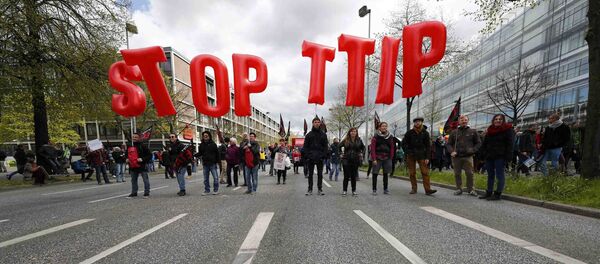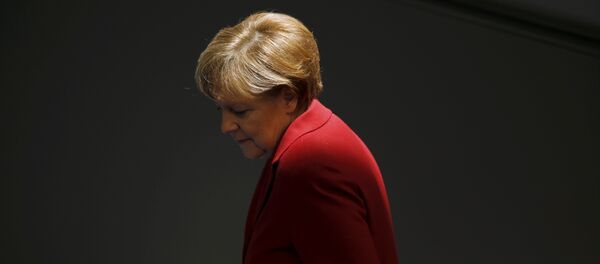A juror for the International Tribunal for Democracy in Brazil wrote a scathing editorial this week denouncing what she calls the illegal government of interim President Michel Temer formed in an attempt by leading members of the opposition Brazilian Democratic Movement Party (PMDB) to avoid enhanced enforcement of the country’s corruption laws.
Azadeh Shahshahani spoke out about her recollection of the tribunal process which determined that the ongoing impeachment process, which appears likely to oust Dilma Rousseff from office permanently, was an illegitimate coup that entirely lacked basis.
She explained that the tribunal was developed by leading social movements in Brazil which invited her and eight other jurors from European and Latin American countries to analyze and render judgment on what was ultimately described as a "break in the democratic process" – "a new type of coup" for 21st century sensibilities.
The tribunal first assessed the charges against Dilma Rousseff, separate and apart from the motivation of the forces leading the impeachment effort, which was that the democratically elected Brazilian leader allegedly improperly transferred funds from a federal bank to cover cash-flow shortfalls in government programs – a practice that previous leaders had used in the past and is not considered a crime.
Jurors for the tribunal found that pursuant to the Brazilian constitution, impeachable offenses must be serious crimes "committed intentionally against legal interests directly linked to the structure of the Constitution and, consequently, the Brazilian state" – the Constitution says nothing of minor non-criminal incidents including budgetary maneuvers to cover program funding shortfalls.
Nor was it found that Dilma Rousseff’s motives for the financial maneuver were for personal enrichment or conducted in order to conceal any act of corruption. The jury found consistent with a report by the Public Prosecutor’s office that Rousseff is not guilty of any crime at all.
The jurors instead found that "what is happening I Brazil is a conspiracy against democracy." Shahshahani said that the "impeachment is being used for partisan purposes to depose a democratically elected leftist president" and that "this is, in effect, a coup."
More concerning may be the motives behind the impeachment proceedings which the editorial succinctly explains as an illegitimate effort engineered by those who “are guilty of massive corruption and grave crimes” in order to prevent the proper administration of justice under Dilma.
This was proven by leaks in the newspaper Folha Sao Paolo of conversations between Sergio Machado and PMDB Party leader Romero Juca discussing implanting “Michel” (Temer) into the presidency by implementing a fraudulent impeachment against Dilma in order to make corruption charges go away.
A similar leak featured Temer’s anti-corruption minister providing detailed instructions to one of the coup’s chief architects, Senate Leader Renan Calheiros, on how to side step the ongoing corruption probe known as the "Car Wash investigation" into the fraudulent administration of contracts between construction companies and the state-owned oil company Petrobras.
Perhaps the most devious of the coup architects was Eduardo Cunha, known by Brazilians as a kingpin who is often compared to the House of Cards character Frank Underwood, who reportedly bribed legislators ahead of the vote to refer impeachment proceedings to the Senate. Cunha was forced to resign by the Brazilian Supreme Court as he is under several corruption probes – he was also prominently featured in the Panama Papers.
Despite the overwhelming evidence against Dilma Rousseff’s accusers, in contrast to the absolutely lack of incriminating findings against the democratically elected president, the Brazilian Senate will conduct their final vote on Tuesday or Wednesday with most analysts expecting a vote to pass by a two-thirds majority of the 81 legislators in the upper house to permanently remove Dilma Rousseff.
This week will not mark the first time that a democratically elected leader has been removed by illegally by the corrupt, but yet it may mark a new and troubling phenomenon of the "constitutional coup" whereby criminals are clothed in a veneer of legality thereby legitimizing, in a macabre sense, a wholly illegitimate act against the will of the people.






